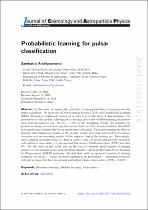| dc.contributor.author | Andrianomena, Sambatra | |
| dc.date.accessioned | 2022-10-18T08:02:11Z | |
| dc.date.available | 2022-10-18T08:02:11Z | |
| dc.date.issued | 2022 | |
| dc.identifier.citation | Andrianomena, S. (2022). Probabilistic learning for pulsar classification. Journal of Cosmology and Astroparticle Physics, (10), 016. https://doi.org/10.1088/1475-7516/2022/10/016 | en_US |
| dc.identifier.issn | 1475-7516 | |
| dc.identifier.uri | https://doi.org/10.1088/1475-7516/2022/10/016 | |
| dc.identifier.uri | http://hdl.handle.net/10566/8061 | |
| dc.description.abstract | In this work, we explore the possibility of using probabilistic learning to identify
pulsar candidates. We make use of Deep Gaussian Process (DGP) and Deep Kernel Learning
(DKL). Trained on a balanced training set in order to avoid the effect of class imbalance, the
performance of the models, achieving relatively high probability of differentiating the positive
class from the negative one (roc-auc ∼ 0.98), is very promising overall. We estimate the
predictive entropy of each model predictions and find that DKL is more confident than DGP
in its predictions and provides better uncertainty calibration. Upon investigating the effect of
training with imbalanced dataset on the models, results show that each model performance
decreases with an increasing number of the majority class in the training set. Interestingly,
with a number of negative class 10× that of positive class, the models still provide reasonably
well calibrated uncertainty, i.e. an expected Uncertainty Calibration Error (UCE) less than
6%. | en_US |
| dc.language.iso | en | en_US |
| dc.publisher | IOP Publishing | en_US |
| dc.subject | Astrophysics | en_US |
| dc.subject | Astronomy | en_US |
| dc.subject | Cosmology | en_US |
| dc.subject | Radio pulsars | en_US |
| dc.title | Probabilistic learning for pulsar classification | en_US |
| dc.type | Article | en_US |

